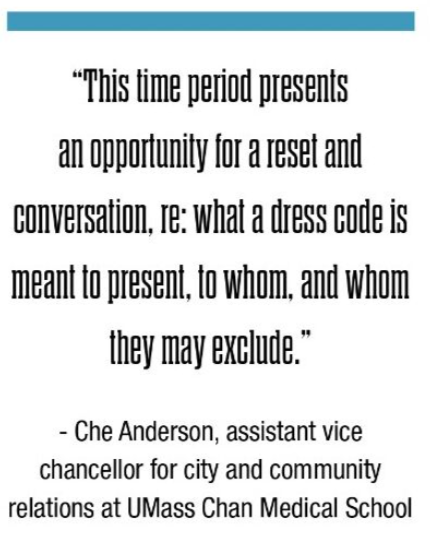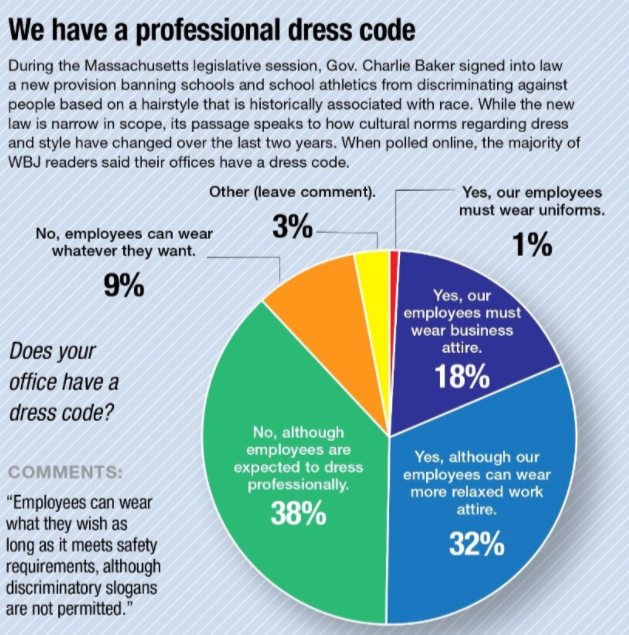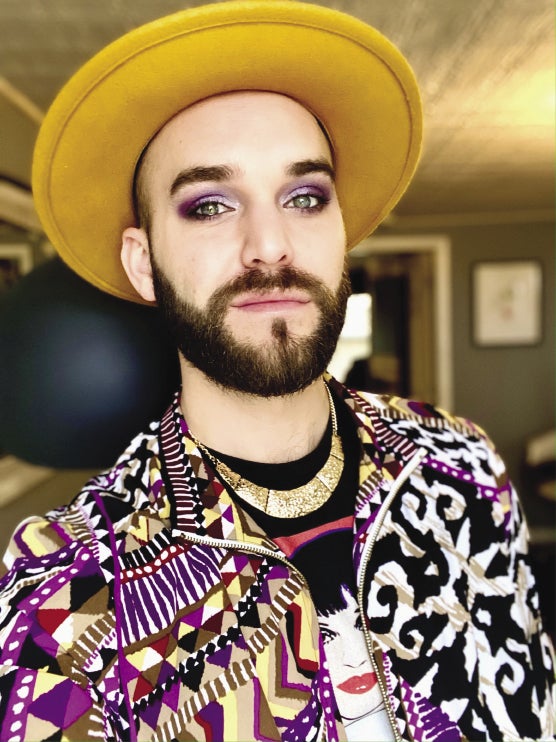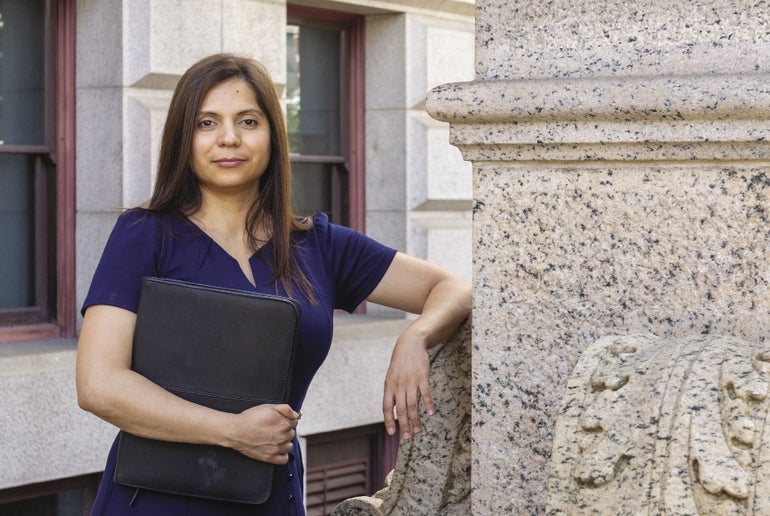On July 26, Massachusetts Gov. Charlie Baker signed this same CROWN Act into law to prohibit discrimination against employees, students, and other individuals based on their natural or protective hairstyle.
Get Instant Access to This Article
Subscribe to Worcester Business Journal and get immediate access to all of our subscriber-only content and much more.
- Critical Central Massachusetts business news updated daily.
- Immediate access to all subscriber-only content on our website.
- Bi-weekly print or digital editions of our award-winning publication.
- Special bonus issues like the WBJ Book of Lists.
- Exclusive ticket prize draws for our in-person events.
Click here to purchase a paywall bypass link for this article.
The history of our nation is riddled with laws and societal norms that equated ‘blackness,’ and the associated physical traits, for example, dark skin, kinky and curly hair to a badge of inferiority, sometimes subject to separate and unequal treatment. Professionalism was, and still is, closely linked to European features and mannerisms, which entrails that those who do not naturally fall into Eurocentric norms must alter their appearances, sometimes drastically and permanently, in order to be deemed professional,” states the California Senate Bill 188, referred to as the CROWN Act.
On July 26, Massachusetts Gov. Charlie Baker signed this same CROWN Act (Creating a Respectful and Open World for Natural Hair Act) into law to prohibit discrimination against employees, students, and other individuals based on their natural or protective hairstyle.
While it was a great win for Black and brown communities across Massachusetts – making it the 18th state to join and enact similar protections – it created a sense of confusion surrounding the significance of the new protections. In U.S. Congress, Rep. Jim Jordan (R-Ohio), called the bill trivial compared to other matters facing the country: “How about a world where gas prices aren’t five dollars a gallon? … How about a world where inflation isn’t at a 40-year high?” He continued, “Those are the issues we should be focused on.”
Unfamiliar with the historical politicization of hair, Jordan, like others critics outside of the Black and brown community, simply do not understand the detrimental impact caused by the stereotypes and biases impacting Black and brown people’s ability to thrive.
Black women are 80% more likely than non-Black women to say they’d had to alter their hair to fit in at work, according to a 2019 survey of more than 2,000 women conducted by British personal care products maker Dove and its Washington, D.C. nonprofit CROWN Coalition. The same study found Black women whose hair was natural or braided were consistently rated as less ready for job performance. The survey showcased the deep biases that threatened the livelihoods of Black and brown people, with an emphasis of Black and brown women.
“I need to have a certain look to fit in”
Gina Plata-Nino, a Worcester attorney for the Massachusetts Law Reform Institute, feels the need to alter her natural Latina features to fit in better at work, despite her impressive professional credentials: a recipient of the Massachusetts Bar Association’s Rising Star Award in 2019, the 2021 recipient of the Katherine Erskine Award for Business and Law from the YWCA Central Massachusetts, and a leader focused on policy in Beacon Hill and challenges in the community.
“My profession as an attorney has always been pretty formal: suits for hearings or court appearances and business attire for everyday occurrences,” said Gina Plata-Nino. “I also straighten my hair so that I can look professional. My curly wavy hair makes me look younger. When I started my career I was told I need to have a certain look to fit in this profession.”
Plata-Nino doesn’t stand alone in her experience. More than 80% of Black women are more likely than white women to agree with the statement: “I have to change my hair from its natural state to fit in at the office," according to the 2019 Dove study.
The data of the study supports the claim that Black women’s hair is more policed in the workplace, thereby contributing to a climate of group control in the company culture and perceived professional barriers. In addition to revealing the additional emphasis placed on corporate grooming policies for Black women, the survey shows the implications of natural hair-based discrimination on perceived job performance and outlook.
“As a woman of color, I have to look professional at all times so that I can be considered an attorney and not the interpreter or assistant,” Plata-Nino said. “I have been in a full suit and have still been asked if I am the interpreter, something my white colleagues do not have to deal with.”
T-shirts, jeans or sneakers
The policing of hair is not a unique experience for only Black and brown women in corporate workplaces. In schools across the country, the education of Black and brown children, especially Black and brown young boys, is disrupted over the conversation of their hair being considered inappropriate. From a 16-year old wrestler in New Jersey that was forced to cut off his dreadlocks right before a match to a 12-year old girl in Orlando expelled over her natural hair being a distraction, the issues hindering the Black and brown community stem into the youth and harp impact both girls and boys.

Black, Indigenous, and people of color “often have to reconsider certain hairstyles that would be deemed unprofessional due to biased ideas, and while many still consider a suit and tie to be the standard for business meetings, they can just as easily occur with polos, t-shirts, jeans or sneakers,” said Che Anderson, assistant vice chancellor for city and community relations at UMass Chan Medical School in Worcester.

The conversations of professionalism in Black and brown communities have been impacted significantly by the standards created by the Eurocentric features sought by society, so much that the Black and brown communities have attacked each other to address their appearance.
When Colin Kaepernick refused to stand for the national anthem as a protest to the oppression of people of color in America, he faced criticism for his afro, including from former player Michael Vick, who is Black and who stated Kaepernick should cut his hair and try to be presentable if he wants to get signed again by the NFL.
“During the pandemic, I was unable to get a haircut so I decided to keep the growth and style my hair differently. This wouldn't have happened without the pandemic, but it was not a matter of a relaxed dress code, and more an assertion that my hair can be professional at any length and in multiple styles,” Anderson said. “This time period presents an opportunity for a reset and conversation, re: what a dress code is meant to present, to whom, and whom they may exclude.”

LGBTQ+ appearances
While the CROWN Act is significant in the conversation of accountability in the workplace and school setting for Black and brown communities, it does not address the discrimination faced by the LGBTQ+ community.
“I work as an independent consultant, so my dress code has been my own. However, there are unspoken and loudly spoken expectations on what is perceived to be professional in specific environments, especially corporate spaces. As a queer and nonbinary person assigned male at birth whose gender expression is usually quite visible (I have a beard and often wear heels and makeup), I am very cognizant as to how my appearance may impact a business opportunity,” said Joshua Croke, owner of Worcester social change agency Action! by Design.

“I've had clients who were executives of corporations express concern for my appearance as a barrier to the team being able to focus and engage, and I've observed measurable differences in who talks to me and about what depending on what I'm wearing. I also want to acknowledge a privilege I have to cover if I want. Despite the harmful nature of covering [conforming to a dominant group or shielding oneself from it)] I can, if I choose, pass as a white cis male, which has a lot of benefits in corporate spaces,” Croke said.
According to an Human Rights Campaign study, more than 53% of LGBTQ+ workers hide their identity at the workplace, often citing a persistent feeling of being unwelcome. Despite massive changes within the business industries, there still lacks a legal and consistent protection to LGBTQ+ individuals state to state.
The CROWN Act protects our most disenfranchised individuals from hair discrimination, but will it ensure Black and brown people feel safe enough to present themselves authentically at work or school without reprimands?

